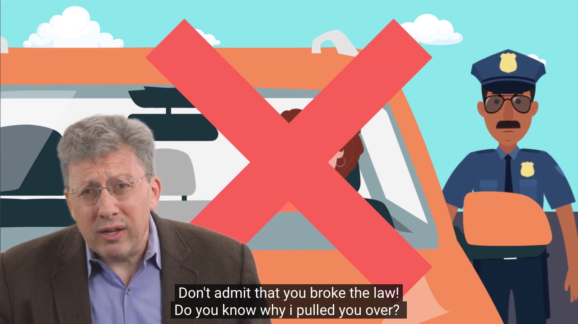Justice Thomas Defends Victims of Policing for Profit
Civil asset forfeiture is arbitrary and unfair, and it gives law enforcement the wrong incentives.
Supreme Court Justice Clarence Thomas is well known for staying silent during oral arguments, but his written statement in response to Monday’s denial of certiorari in Leonard v. Texas posed a question that was heard loud and clear throughout the legal community. That question asked “whether modern civil-forfeiture statutes can be squared with the Due Process Clause and our Nation’s history.” In other words, why are police still allowed to seize property from people without ever charging them with a crime?
According to the facts of the petition, a Texas police officer stopped James Leonard and Nicosa Kane on April 1, 2013, for a traffic infraction. A search of the vehicle yielded the discovery of a safe in the trunk, which contained $201,100 and a bill of sale for a Pennsylvania home. The money was seized because law-enforcement officials believed that it was “substantially connected to criminal activity,” including the sale of narcotics. James Leonard’s mother, Lisa Olivia Leonard, claimed to be the rightful owner of the money from the house sale and sued the government to regain it. But because she didn’t raise her due-process claims at the trial level, the Supreme Court declined to hear her case, leaving her with little recourse.
The whole procedure seemed wrong to Thomas, and not just because neither Leonard nor Kane had been charged with a crime. Thomas cites multiple examples of other individuals who had their property seized by the police with dubious justification, noting that “forfeiture operations frequently target the poor and other groups least able to defend their interests in forfeiture proceedings.”
Americans have a right to presumed innocence, making the idea of the government’s seizing property without due process incompatible with the Constitution and our founding principles. However, this has not stopped law enforcement from commonly using the practice — known as civil asset forfeiture — to seize property they have “probable cause” to believe was involved in criminal activity.
TOP STORIES
Nikki Haley’s Sin Isn’t Racism
The Hard Realities Facing Ron DeSantis
Maine Secretary of State Rules Trump Is Disqualified from 2024 Ballot
Francis Collins’s Covid Confession
A Reckoning for the Rising-Inequality Narrative
The Peace Processors Return
Because this is a civil procedure, the government doesn’t have to establish guilt before seizing the property in question. If the owner wants to reclaim it, he or she must prove to the government that it has no connection to criminal activity. This turns the concept of “innocent until proven guilty” on its head.
Supporters argue that civil forfeiture swiftly cuts off the proceeds (cash, vehicles, and other property) of crime, which can then be used to fund law-enforcement activity. But many scholars, such as the late Leonard Levy, note that the practice might have the opposite effect — rather than increasing a department’s ability to fight crime, it “subordinate[s]” police to the role of “making money for one’s department.” A bad incentive scheme ensures that, while cash and property are seized, “the criminal isn’t prosecuted.”
Americans have a right to presumed innocence, making the idea of the government’s seizing property without due process incompatible with the Constitution and our founding principles.
But if public safety is the goal, shouldn’t law-enforcement officers focus on preventing crime rather than chasing profit after a crime has been committed?
While law-enforcement figures, including state and federal attorneys general, have reiterated that civil forfeiture is, to quote former U.S. attorney general Loretta Lynch, “an effective tool” against crime, proponents often conveniently overlook the effect it has on victims.
While programs such as civil asset forfeiture were born of good intentions, perverse incentives ultimately draw law enforcement away from pursuing criminals and undermine the public’s trust. The administration and the law-enforcement community are correct to view public safety as a priority, but fighting crime requires appropriate incentives. Among advocates who wish to protect innocent property owners and strengthen due process, they have a willing ally.
Fortunately, Florida, Michigan, Nebraska, New Mexico, and Ohio have taken steps to ensure that the rule of law is preserved, innocent parties are protected, and law enforcement remains equipped to fight crime. New Mexico now requires a criminal conviction before law enforcement can seize property, while police in Florida must prove “beyond reasonable doubt” that property is linked to a crime before it’s seized.
Justice Thomas is right to question the modern-day practice of civil asset forfeiture. Let’s hope Congress and the states will pay attention.
You might also like:
Asset Forfeiture of Intellectual Property | Civil Asset Forfeiture with AGLA | Comedy: Law & Order Civil Asset Forfeiture Unit | Civil Asset Forfeiture: An Overview & Conversation | Small Heroin Sale Tees Up High Court Test of Forfeiture Laws | Fighting Back against Government Theft | Civil Asset Forfeiture Victim Gets His Money Back! | The Role of Probable Cause in Forfeiture Cases | Walberg Introduces the Civil Asset Forfeiture Reform Act | Breaking Down Asset Forfeiture: Know Your Rights | North Dakota Takes A Bite Out Of Civil Asset Forfeiture | Asset Forfeiture Legal Resources | Massachusetts Worst in Nation for Civil Forfeiture Laws | South Carolina Supreme Court drops the ball on asset forfeiture reform | AYS Civil Forfeiture | Filmmaker Got Back His $69,000 ‘Stolen’ by DEA Agent, Plus a $15,000 Settlement | Walberg Champions Amendment to Rein in Civil Forfeiture Abuse | Supreme Court Delivers Unanimous Victory for Asset Forfeiture Challenge | The FBI Is Trying to Keep More Cash Seized from a Beverly Hills Vault | This Is How the Government Robs the Innocent | Civil Asset Forfeiture | Civil Asset Forfeiture: Unconstitutional As Applied | Why Asset Forfeiture Requires Specialized Defense Skills | Sanctioned oligarch accuses U.S. of stealing his assets, vows to fight in Russian court | Indiana Supreme Court Finally Puts an End to the Timbs Asset Forfeiture Case— “Reminiscent of Captain Ahab’s Chase of the White Whale Moby Dick”









![0x0[1]](https://www.rucci.law/wp-content/uploads/2023/12/0x01-1-scaled-1.jpg)

